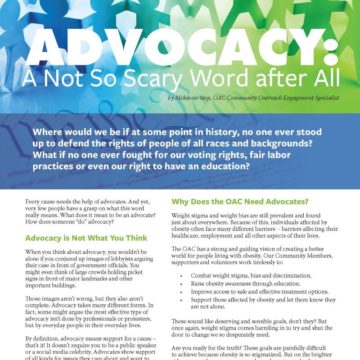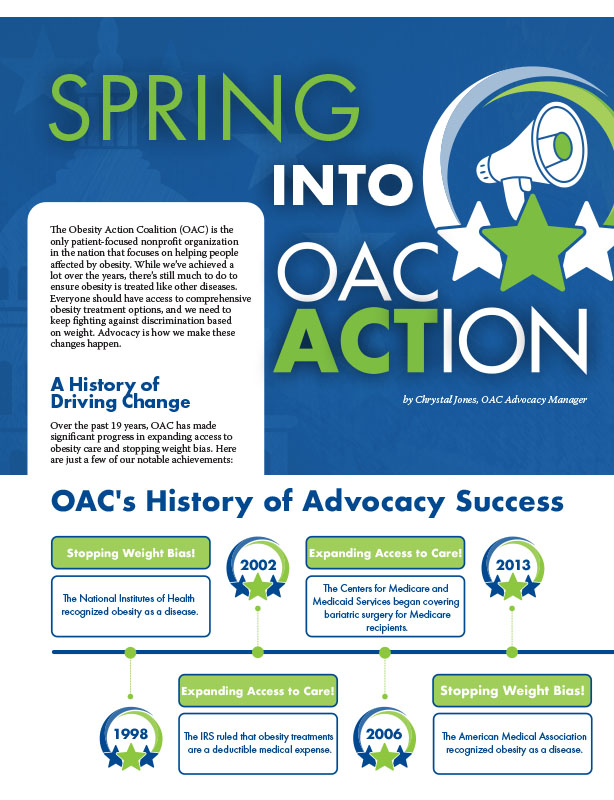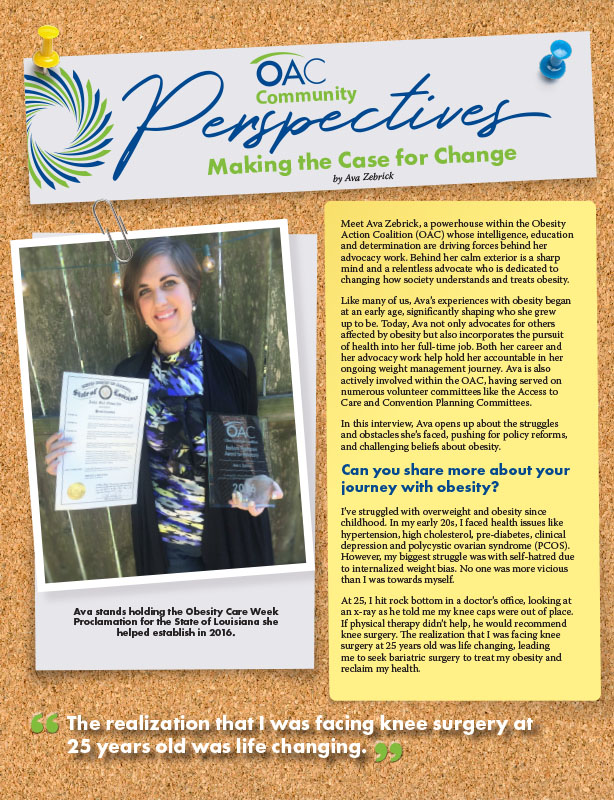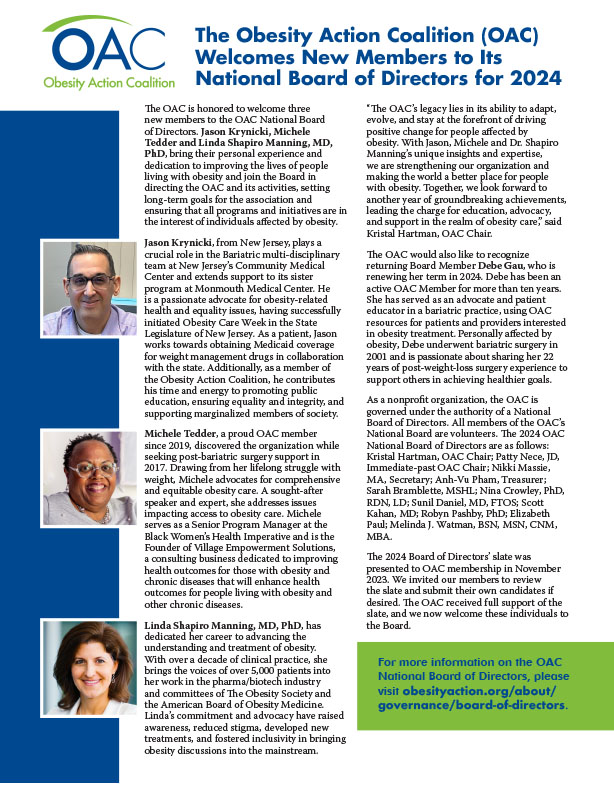OAC Perspectives: My Journey Brought Me Self-Awareness

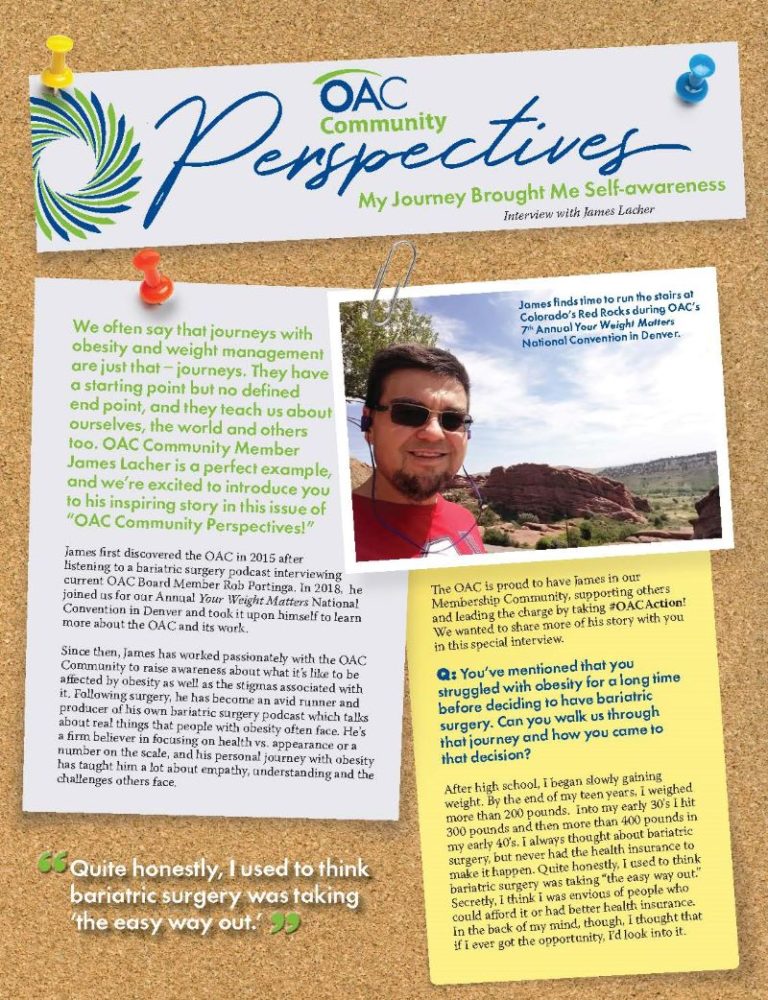
Interview with James Lacher
Winter 2019
We often say that journeys with obesity and weight management are just that – journeys. They have a starting point but no defined end point, and they teach us about ourselves, the world and others too. OAC Community Member James Lacher is a perfect example, and we’re excited to introduce you to his inspiring story in this issue of “OAC Community Perspectives!”
James first discovered the OAC in 2015 after listening to a bariatric surgery podcast interviewing current OAC Board Member Rob Portinga. In 2018, he joined us for our Annual Your Weight Matters National Convention in Denver and took it upon himself to learn more about the OAC and its work.
Since then, James has worked passionately with the OAC Community to raise awareness about what it’s like to be affected by obesity as well as the stigmas associated with it. Following surgery, he has become an avid runner and producer of his own bariatric surgery podcast which talks about real things that people with obesity often face. He’s a firm believer in focusing on health vs. appearance or a number on the scale, and his personal journey with obesity has taught him a lot about empathy, understanding and the challenges others face.
The OAC is proud to have James in our Membership Community, supporting others and leading the charge by taking #OACAction! We wanted to share more of his story with you in this special interview.
Q: You’ve mentioned that you struggled with obesity for a long time before deciding to have bariatric surgery. Can you walk us through that journey and how you came to that decision?
After high school, I began slowly gaining weight. By the end of my teen years, I weighed more than 200 pounds. Into my early 30’s I hit 300 pounds and then more than 400 pounds in my early 40’s. I always thought about bariatric surgery, but never had the health insurance to make it happen. Quite honestly, I used to think bariatric surgery was taking “the easy way out.” Secretly, I think I was envious of people who could afford it or had better health insurance. In the back of my mind, though, I thought that if I ever got the opportunity, I’d look into it.
Q: What are some of the struggles you faced in dealing with obesity?
Obesity negatively affects one’s life in so many ways. For one, it hurts self-esteem. I didn’t feel good. I didn’t look good. I felt judged solely on my weight. I couldn’t buy clothes at “regular” stores and I had to buy a bigger car. I had to sit at tables instead of booths at restaurants. My health was poor as I struggled with diabetes, hypertension, high blood pressure, high triglycerides, gout and neuropathy. I was on seven medications at one point! Basically, my quality of life suffered because of my weight.
Q: When did you decide to have bariatric surgery? What did that decision and process look like for you? How did surgery change your perspective on your health?
In 2013, I finally landed a job with decent health benefits. When I found out they covered bariatric surgery, I started the process. I then found that getting approved was not easy! No one seemed to give me straight answers about how the process worked, and my doctor’s office flubbed the paperwork numerous times. What should have been a 9-12 month process turned out taking 18 months.
I faced so many ups and downs during this time. I tried to remain optimistic, but it was hard. As it got closer and appeared that it might actually happen, it gave me hope! I saw a fighting chance against obesity and a better life. Surgery finally became a reality for me on March 16, 2015.
Q: Throughout this journey, what have you learned about obesity, treatment options and common misperceptions?
I consider myself very lucky. I had lots of support from friends and co-workers, but I’ve learned that the medical community still has a lot to learn about obesity. And so do patients! There are a lot of bariatric surgery “myths” out there regarding best practices, and many people are making health decisions based on bad science and conventional wisdom. Most people still think it’s someone’s fault if they have obesity, but it’s so much more than “they eat too much.”
Q: In your post-surgical journey, you do your best to educate others about obesity and raise awareness. Can you tell us a little more about your advocacy work, such as what inspires you to do it and what benefits you’ve seen from it?
Obesity is a complex disease that affects everyone differently. A person’s age, genetics, environment, culture, socioeconomic status, education and family all affect their life and how they cope. Nowadays, I’m all about promoting overall health.
Significant weight-loss doesn’t happen overnight, but if you start taking hold of your weight and health today, you’ll see positive changes within a few weeks. Even with modest weight-loss, quality of life significantly improves. That’s the lesson I try to stress on the bariatric surgery podcast that I produce, all while offering support and raising obesity awareness.
Basically, we all want good health – but we define “good health” differently. You don’t have to run a marathon to be healthy! When people tell me, “Hey, I really like what you said on your podcast,” or, “I went for a hike the other day because of you,” those comments inspire me to keep doing positive things for my current and future health. I want to live my best life possible, inspire others and be inspired in return!
Q: What is something you wish everyone knew about obesity – even those who don’t struggle with it?
For those who don’t struggle with weight, I wish they knew that people affected by obesity are still like them. Various factors may have contributed to their weight, and often over many decades. Genes, nutrition, exercise and environment all play a big role.
I want everyone to know that obesity is a disease that deserves treatment – just like cancer or heart disease. We must find solutions for individuals who are struggling so their quality and quantity of life can improve. Regardless of anyone’s size, we should support each other in our pursuit of health and happiness. We’re better off as a society when we do.
Q: How has the OAC helped you on your journey with obesity and your life after bariatric surgery? How has the OAC changed your perceptions and your advocacy work?
It feels good to know there’s an organization out there devoted to helping people like me. The OAC Community has been great! I love that it focuses on health and not on appearance or a number on the scale. I’m very happy with my weight and health right now, but I also know that even if I gained a few pounds, I wouldn’t be a “bad” person.
We all go through ups and downs in life, and it’s great to have support like the OAC Community along the way. Going to YWM2018 as well and meeting people online and in-person opened my eyes to the individual challenges we all face. Hearing personal stories has made me even more empathetic to my brothers and sisters who struggle with this disease.
by Chrystal Jones, OAC Advocacy Manager Spring 2024 The Obesity Action Coalition (OAC) is the only patient-focused…
Read Articleby Ava Zebrick Spring 2024 Meet Ava Zebrick, a powerhouse within the Obesity Action Coalition (OAC) whose…
Read ArticleThe OAC is honored to welcome three new members to the OAC National Board of Directors. Jason Krynicki,…
Read Article





